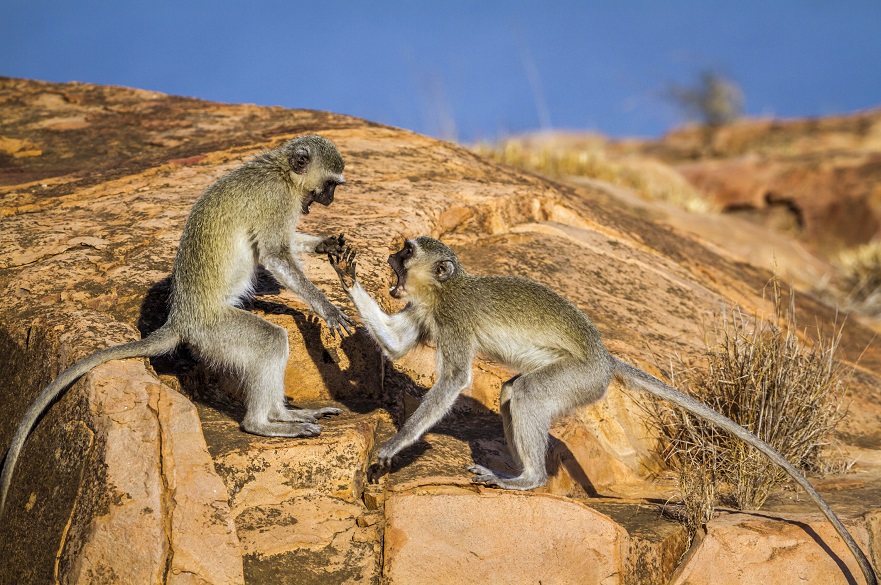Feverish monkeys get kicked when they’re down – new study explores illness and aggression in wild primates
Monkeys suffering from a fever are twice as likely to be the victims of aggression from members of their own social group looking to advance their dominance, according to the first study to monitor fevers in wild primates and reveal the social cost of infection among the species.
By Helen Breese | Published on 13 October 2021
Categories: Press office; Research; School of Social Sciences;

Using state-of-the-art miniature data loggers, researchers led by Dr Richard McFarland from Nottingham Trent University obtained continuous measurements of core body temperature in a group of wild vervet monkeys over a six-year period. They detected 128 fevers in 43 monkeys, totalling 776 fever-days.
Behaviour during periods of fever included loss of appetite and fatigue, but the monkeys did not reduce interaction with their social group.
This temporary loss of capacity was detected by other members of the group, offering them competitive opportunities. As well as receiving more aggression, those with a fever were six times more likely to get injured, compared to those without.
Of the 412 days on which a monkey was febrile, 39% involved aggression and 8% resulted in newly acquired injuries. Across all aggressions directed toward victims with a fever, 80% were male and 20% were female – attackers were found to be both male and female regardless of the victim.
When comparing the relative risk of injury to the day on which a fever started, the monkeys were more likely to get injured in the days closer to the onset of a fever, with the maximum probability of injury being two days after the onset of a fever. These results suggest that injuries were more likely when a monkey already had an established fever and were not the cause of the fever itself.
Dr Richard McFarland discusses the study on feverish vervet monkeys
Dr Richard McFarland, senior lecturer in Psychology at NTU’s School of Social Sciences, has spent almost ten years studying the thermoregulation of primates in South Africa, including the impact of climate on their behaviour. He said: “While there are many positives for monkeys who live in social groups – such as protection from predators and improve reproductive success – we’ve demonstrated, for the first time in a wild primate, a hidden cost of sociality.
“These monkeys live in relatively stable dominance hierarchies, but we saw sick animals targeted by their own peers when they were sick, and least able to fight back, potentially improving the attacker’s social status, and further reducing a sick animal’s survival prospects.”
“The results help us to understand disease transmission and the ways in which social structure can change as a result of infection.”
The paper Fevers and the social costs of acute infection in wild vervet monkeys has been published in PNAS (Proceedings of the National Academy of Sciences of the United States of America).
Notes for Editors
Press enquiries please contact Helen Breese, Public Relations Manager, on telephone +44 (0)115 848 8751, or via email.
Notes to editors
Press enquiries please contact Helen Breese, Public Relations Manager, on telephone +44 (0)115 848 8751, or via email.
About Nottingham Trent University
Nottingham Trent University (NTU) was named University of the Year 2019 in the Guardian University Awards. The award was based on performance and improvement in the Guardian University Guide, retention of students from low-participation areas and attainment of BME students.
NTU was also the Times Higher Education University of the Year 2017, and The Times and Sunday Times Modern University of the Year 2018. These awards recognise NTU for its high levels of student satisfaction, its quality of teaching, its engagement with employers, and its overall student experience.
The university has been rated Gold in the Government’s Teaching Excellence Framework – the highest ranking available.
It is one of the largest UK universities. With over 37,000 students and more than 4,000 staff located across four campuses, the University injects £1.6bn into the UK economy. It has been the largest recruiter of UK undergraduates in each of the last four years. With an international student population of more than 6,000 and an NTU community representing around 160 countries, the University prides itself on its global outlook.
The university is passionate about creating opportunities and its extensive outreach programme is designed to enable NTU to be a vehicle for social mobility. NTU is among the UK’s top five recruiters of students from disadvantaged backgrounds and was awarded University of the Year in the UK Social Mobility Awards 2019.